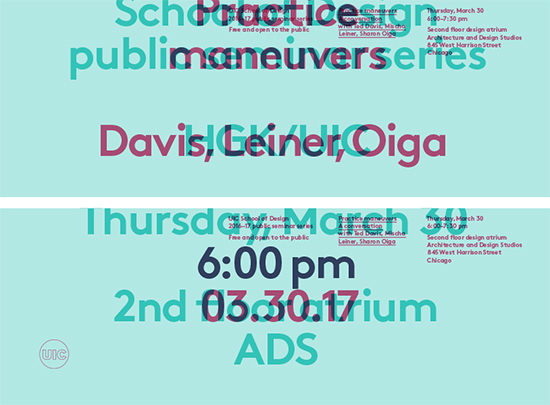2016–17 Public Seminar Series: Ted Davis, Mischa Leiner, Sharon Oiga
UIC School of Design 2016–17 public seminar series
Practice maneuvers: A conversation with Ted Davis, Mischa Leiner, and Sharon Oiga
This panel will take up the diverse range of practices that graphic designers are defining for themselves today. Trajectories both within and beyond the profession now seem conceivable that far exceed the paths established during graphic design’s emergence as an independent area of practice in the twentieth century. Maneuvering within this shifting terrain will be the focus of discussion. Participants: Ted Davis, Mischa Leiner, and Sharon Oiga; moderator: Jonathan Mekinda.
Ted Davis is an artist and designer based in Basel, Switzerland; and Mischa Leiner is the owner of CoDe, a design practice based in Zurich and New York. Both serve on the faculty of the Visual Communication Institute at the Academy of Art and Design FNHW. Sharon Oiga serves on the design faculty at UIC and is Vice Chair of the Society of Typographic Aficionados, which hosts the international TypeCon conference.
The UIC School of Design public seminar series serves as a research platform for the school’s Master of Design (MDes) program, stimulating broad intellectual inquiry about the values guiding the designer by promoting discourse across industrial and graphic design.
Thursday, March 30
6:00–7:30 pm
Second floor design atrium
Architecture and Design Studios
845 West Harrison Street, Chicago
Free and open to the public
UIC School of Design 2016–17 public seminar series:
Design operations
This series of seminars proposes to examine the diverse constraints within which designers work today and to explore ways in which designers can productively engage those constraints to define and advance their own programmes, agendas, and objectives. Much of contemporary design discourse emphasizes the power and autonomy of designers and aims to articulate the deep foundations and wide scope of their reach. Similarly, celebrated works of design are widely regarded as transformative agents that single-handedly overturn established systems and routines. From the popular reverence for “genius” designers, whether of the past or the present, to the inclusion of single works of design in museum collections, contemporary discourses of design—disciplinary as well as popular—largely foster a view of design practice that centers on the capacity of designers to see beyond existing norms and conventions, which they then radically reconfigure or even overturn through their work.
Against this view, this seminar proposes a more nuanced engagement with the systems and networks within which designers operate. The premise for this engagement is that those systems and networks constitute the only channels through which designers—and their designs—can act; as such, they serve to instantiate and transmit, even expand and multiply, the power of design. Acknowledgment of these conditions—simultaneously integral to but outside of design itself—does not diminish the authority of the designer. Instead, from this perspective, success in design is most often the product of designers effectively examining and turning to their own purposes the operations of existing systems and networks rather than working rejecting and overturning those operations altogether. “Design operations” then refers on the one hand to the maneuvers designers undertake to advance their own disciplinary ambitions and, on the other, to the workings of the social, political, economic, and technical systems and networks of power that configure the channels of design even before designers can act.
